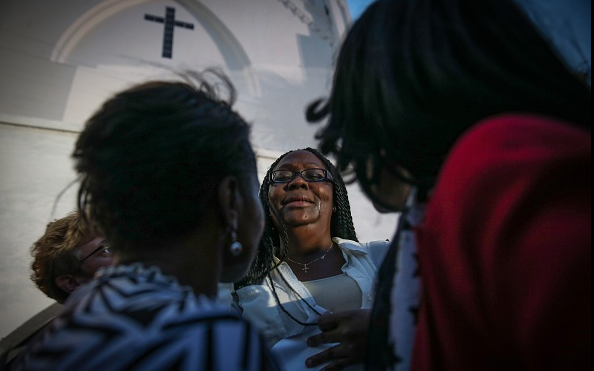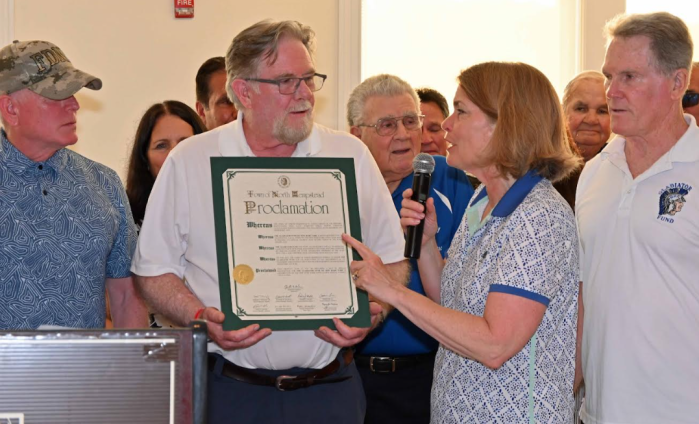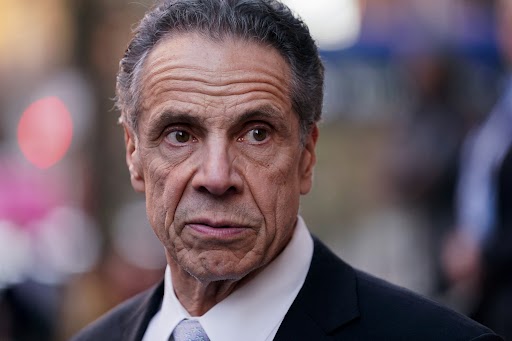Rev. Craig Robinson, the pastor of the nearly 150-year-old Bethel African Methodist Episcopal Church in Bay Shore, was walking out of Bible study class Wednesday when tragic news blared from his phone.
Nine people killed inside historic Emanuel A.M.E. Church in Charleston, South Carolina. Pastor among the dead. White gunman on the loose.
“My knee-jerk reaction was confusion,” Robinson, 29, recalled.
His brief moment of disorientation quickly descended into anguish.
Robinson then became succumbed by “profound numbness,” he said.
The nine people fatally shot by a 21-year-old gunman ranged in age from 26 to 87. They were participating in Bible study class—a common weekly event in African Methodist Episcopal churches, formed after the American Revolution by African Americans peacefully protesting racism at a Methodist church in Philadelphia. Burned down by white supremacists, Emanuel A.M.E. Church was rebuilt in 1834, rising out of the ashes like a phoenix—staring hate in the face and becoming a symbol of determination and hope for generations of its devout parishioners, now numbering 3 million worldwide.
The alleged gunman, Dylann Storm Roof, who was captured in North Carolina following a tip from a brave florist, mingled among the living inside the church where Booker T. Washington and Martin Luther King Jr. once spoke, and, according to police, opened fire after about an hour. He reloaded as many as five times, police said. The .45-caliber pistol, according to his uncle, was a gift from his father.
The shooting brings to the fore once more the divisive debate about gun violence in America as well as the state of race relations in this country. The backdrop: South Carolina, where a confederate flag defiantly soars above its State House—the same flag emblazoned on Roof’s license plate, according to reports.
Fueled by racism, enabled by what some deem lax national gun laws, and committed in a house of worship revered as a historical refuge and stronghold from the prejudice and bigotry unleashed—often violently—against the African American community since Emanuel A.M.E. Church’s 1816 founding, Wednesday’s mass slayings resonated deep with local civil rights leaders, gun control advocates, and the leaders of LI’s own African Methodist Episcopalian congregation.
“This was a horrific violation of rights on all levels,” Frederick Brewington, an outspoken Hempstead-based civil rights attorney and board member of Syosset-based nonprofit Erase Racism, told the Press. “And it took me back to the type of attacks that we as a country had seen when we saw the bombing of the 16th Street [Baptist] Church, when four little girls were killed, an attack on a religious institution.
“The underlying factors of race being a motivated factor for this gentleman was particularly disturbing,” he said.
Roof, who was pictured in Facebook photos with South African apartheid-era patches on his clothes, allegedly spewed hate-filled venom as his victims desperately sought answers.
“You are raping our women and taking over the country,” Roof allegedly told one of his victims amid the violence.
On Friday, one day after his capture and extradition back to South Carolina, Roof was charged with nine counts of murder for a shooting spree that some have equated to a modern-day lynching.
The FBI is investigating the shooting rampage as a hate crime.
Photos from Roof’s perp walk show him sneering.
Meanwhile, a nation is in mourning—yet again.
A CALMING PRESENCE LOST
Among the dead in the Wednesday evening massacre was the church’s pastor, Rev. Clementa Pinckney, also a South Carolina state senator.
Robinson knew Pinckney. He had met the venerable pastor around the time he began running for state senate. Robinson came away impressed. He still remembers the moment Pinckney handed him his card.
“A really charismatic presence,” Robinson said of the slain pastor. “A very commanding presence.”
They weren’t extremely close, but the pair had mutual respect for one another.
“When I realized that he had passed away, that he was one of the ones murdered, it definitely did touch me in a different way because I could share in the story.
“I, too, was touched by his [life] even in a very small way,” he said.
It’s times like these that parishioners would seek out Pinckney for guidance, as they did following the recent police shooting that led to the death of 50-year-old Walter Scott, an unarmed black man in South Carolina.
“Today, the nation looks at South Carolina and is looking at us to see if we will rise to be the body, and to be the state that we really say that we are,” Pinckney had told his state senate colleagues. “Over this past week, many of us have seen on the television, have read in newspapers, and have seen all the reports about Walter Scott, who, in my words, was murdered in North Charleston. It has really created a real heartache and a yearning for justice for people, not just in the African American community, but for all people, and not just in the Charleston area, or even in South Carolina, but across our country.”
Now it’s up to others like Robinson to uncover a sliver of hope in the face of immense pain and to lift the spirits of those torn apart by the recent intersection of racism and gun violence, an unenviable task.
Robinson is Bethel’s chief theologian, yet he continues to participate in weekly Bible study.
“I learn things from my congregation all the time and I preach about it in my sermon,” he said.
It’ll be at this Sunday’s sermon where he intends to address Wednesday’s unconscionable tragedy.
Such unexplainable incidents can be “unnerving, disorienting, and confusing,” he conceded. “It can incite fear and doubt in a lot of people’s minds.”
Despite the progress America has made in the 150 years since the end of the Civil War and the decades since the civil rights movement, the country may still have to look to its past in order to crack away at the underlying issues that breed intolerance and prejudice and open it up to sunlight for all to see, community leaders said.
America, Robinson said, has yet to confront its “birth defect.”
“This nation is built on the three-fifths law in the Constitution; this nation is built, especially the Southern part of this nation—if we really take the history of this country seriously—it was built on the backs of slavery.
“The Western part of this county was built on the backs of Native Americans, Mexican and Chinese immigrants, who were thought to be subhuman and only good for labor—that is the history of America.
“Slavery built the nation’s capital,” he continued. “At the very core of America’s invention and creation there is this clear prejudice against people of color, and that’s part of America’s original birth defect.”
Brewington, Long Island’s prominent civil rights attorney, also believes it’s time for America to engage in deep reflection, however shameful the flaws may be.
Now may be the time to have an “open and frank and respectful discussion about our historical underpinnings,” he said. “And the fact that we are built on a foundation that structured itself on the most vicious form of human bondage known to man.”
Slavery, racial segregation under Jim Crow, that “was our history,” Brewington added. “We were all part of it, either we supported it, we did nothing about it, or we were the victims of it, and that’s where we need to start.”
As it typically is with race, such a conversation won’t be comfortable. Nor should it be, said Robinson.
“I don’t think there will ever be a time when talking about race and its effect on all people involved is ever going to be a comfortable conversation,” he said.
“It’s going to be uncomfortable,” Robinson added.
“I think there’s real courage when you do the thing that is uncomfortable,” he continued. “That is part of what courage is about. It’s facing the uncomfortable thing with a certain level of fortitude.”
Those seeking inspiration need look no further than the founding of the very congregation where nine God-loving people drew their final breaths.
Roughly 11 years after America gained independence, a former Delaware slave named Richard Allen decided he had just about had enough. Protesting segregation at St. George’s Methodist Church in Philadelphia, Allen and a group known as the Free African Society staged a walkout.
Thus, the African Methodist Episcopal Church was born.
Their act of defiance spread to other major cities across the Northeast. By the 1800s, an African Methodist Episcopal Church was formed in Harlem, where it still stands tall.
It was a tumultuous time, and expansion came at a cost.
A group of white supremacists burned Bethel African Methodist Episcopal Church in Charleston to the ground. Instead of living life in fear, the congregation rebuilt the church in 1834.
Out of the ashes, the movement grew. In 1865, Bethel African Methodist Episcopal Church in Bay Shore was formed.
In 2016, the entire A.M.E. church will celebrate its bicentennial. Its two-century old mission remains as relevant as ever.
AMERICA’S SCOURGE

Carolyn McCarthy’s 17-year career in Congress was defined by tragedy.
The 1993 Long Island Rail Road Massacre killed her husband and permanently injured her son.
Then a nurse, McCarthy decided a career change was in order. Her desired destination: the halls of Congress.
The former Democratic congresswoman last year decided not to seek reelection after a long battle with cancer.
The issue that spurred her into action, gun control, however, remains very much on her mind.
McCarthy said she sympathized with President Obama, who appeared frustrated with the lack of progress on gun control during his remarks on the Charleston shooting.
“I understand how the President felt because certainly I felt that way for a lot of years when we thought we had a bill that could pass, going way back to Columbine and even before that,” McCarthy told the Press.
“It’s just common sense, but this country is just not ready for it,” she conceded. “It breaks my heart when I see what happened in a church.”
Although law enforcement in recent years have been focused on Islamic terrorism, it’s mass shootings that have claimed far more lives.
In 2014, for example, 30 mass shootings in the United States killed four or more people, resulting in 136 deaths, according to the Triangle Center on Terrorism and Homeland Security at Duke University.
Tom Goodhue, executive director of Long Island Council of Churches, isn’t so sure gun control measures would’ve prevented the alleged gunman from carrying out his plan in South Carolina.
“What we haven’t begun to think about…is how do we secure gun safety?” Goodhue said. “All of the gun control legislation in the world doesn’t help you much if a father gives a troubled young man a .45.”
“Newtown happened with a gun purchased legally by the mother and stored in an unlocked gun cabinet,” he added.
McCarthy more than anyone else understands the minefield that is gun control. It was never her intention to infringe on Americans’ right to own a gun, she said. But accessories like high-capacity magazines, which enable someone to fire off dozens of bullets in seconds, trouble her. Oftentimes before law enforcement arrives, the carnage is over.
The former Congresswoman said that taking away Americans’ right to bear arms will never happen. “It’s in the Constitution that they’re allowed to own guns,” she said. “But I think the majority of gun owners agree that there are people that shouldn’t have a gun.
“The battle will continue.”
Robinson said the problem goes even deeper than gun control and racism. It’s America’s propensity for violence that also spurs such incidents like the one in Charleston.
“Guns aren’t the problem, and controlling them isn’t necessarily going to do anything, but what is the problem is that the culture of violence in this country and around the world and in human nature allows us to devalue human life.”
He often thinks back to something one of his favorite theologians once said: “Violence comes when we cease to see another person as human.”
“This is a human question,” he said. “There’s no reason you need to kill a deer in the forest. Most people in this county aren’t living a subsistence lifestyle, so it’s for sport.”
“We don’t value life,” Robinson added. “And no amount of gun control laws is going to make a human value life more, and that’s where I think the church is going to have to step in.”
And so it’s up to houses of worship—the very place where evil reared itself once again—to be a place of healing.
Goodhue doesn’t quite know what churches, synagogues, and mosques can say or do to repair shattered hearts.
“There’s a pathology at large here that’s far beyond simple healing,” he said. “This is far more complex healing…we all have some work to do in all of this.”
It’s possible that the nation will derive strength from the individuals suffering the most. On Friday, several members of the victims said they forgive the alleged shooter.
“I still have hope,” said Robinson. “As a minister, as a follower of Jesus, as a person of faith, I still believe that goodness is possible. I still believe that these types of courageous conversations can happen and do happen…I am confident that peace is possible because I have peace. And it starts with each individual finding that place of peace and sharing it with your neighbor.”
–With Jaime Franchi and Christopher Twarowski


































